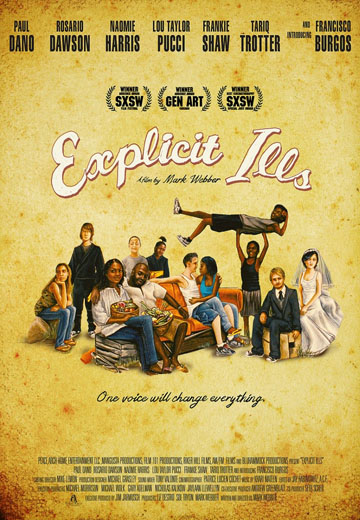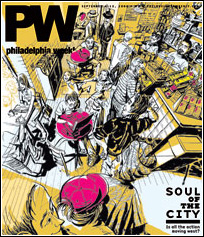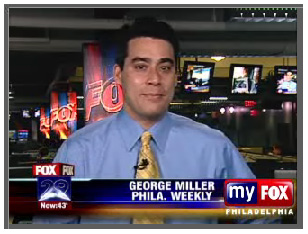Explicit Ills.
Mark Webber's debut film is a love letter to Philly -- and an indictment of what ails her.
From the March 13, 2009 Philadelphia Weekly.
The average Hollywood writer wouldn't understand Philly. A run-of-the-mill, fast-talking, Botox-ed hack wouldn't appreciate the nuances of our city, a place so easily maligned and yet one with soul, pride and unconventional beauty.
It takes a local to capture the essence of our attitude - libertarian to the core but annoyed about how everyone else's freedoms obstruct our own.
Mark Webber gets it.
Webber, a 28-year old who attended the High School for the Creative and Performing Arts, wrote and directed Explicit Ills, a Philly-set feature film that opens tonight at the Ritz at the Bourse.
"It's really personal for me," he says. "The film is based on a lot of life experiences that I've had, conflicts and situations I've been in."

Webber was born in the Midwest but spent his formative years living in Philly. He and his mother, human rights activist Cheri Honkala, lived on the street for about eight months when they first arrived here, crashing under the El or along 5th Street between Girard and Lehigh.
As a teenager, he marched alongside his mother and the citizens' empowerment organization she founded, the Kensington Welfare Rights Union. He learned the tales of those around him - the impoverished, addicted and ailing - and it influenced his life.
"I wasn't trying to create a documentary-style, gritty account of my life," Webber says of the film, his first as a director. "I wanted to take these big troublesome, real life issues and heighten things in a film that was entertaining and pleasing to look at."
The result is a visually engaging series of vignettes about four sets of struggling Philadelphians leading parallel but separate lives. Most of the characters are dealing with issues of money, drugs, love or social injustice. The bulk of the action takes place amid the colorful, crumbling homes of Kensington or resurging Northern Liberties, Webber's old stomping grounds.
"I used to go fuck around with my friends at the old Schmidt's Brewery (in Northern Liberties)," he says. "Everything in the film hits really close to home."
Several of the scenes are real - like the food distribution for the needy that was filmed at 5th and Lehigh. Some of the actors are local kids who showed up at an open casting call. Most of the characters are rooted in people Webber knew in Philly before his acting career led him away.
Babo (Francisco Burgos) is a seven-year old living in poverty with his mother, played by Rosario Dawson. The closest thing to a central character in the movie, Babo suffers from asthma, he mopes around, gets picked on by the school bully, then picks up dog shit to earn money so that he can buy the bully a brand new pair of sneakers.
He befriends Rocco (Paul Dano), an aspiring actor whose career trajectory has rocketed him to performing as a ninja at a kid's birthday party in North Philly.
"You shouldn't be smoking," the precocious Babo tells Rocco while they are both hiding from the party action.
"Yes, you are right," Rocco responds. "But at this moment, getting a little closer to death is a good thing."
Teenager Demetri (Martin Cepeda) lives near Babo but he spends the entire film wooing a girl (Destini Edwards). He first tries the tough guy approach ("You want to kiss me tomorrow?" he asks her). When that fails, he transforms himself into an aloof, argyle sweater vest-wearing bookworm.
It seems everyone in the film is trying to be something they are not.
Hipster art school student Michelle (Frankie Shaw) smokes pot to lose her inhibitions. She falls for her fixie-riding drug dealer, Jacob (Lou Taylor Pucci). We follow them through the nascent stages of their drug-induced, tumultuous relationship that feels far removed from Babo.
Finally, there is Kaleef (Tariq Trotter, aka "Black Thought" from The Roots), his pot-smoking wife Jill (Naomie Harris) and their weightlifting son Heslin (Ross K. Kim-McManus). Kaleef dreams of opening a health food/ produce store, and he makes his own colon cleanser.
"Everybody poops," he tells a potential investor.
Webber says he wrote the character for Trotter, a longtime friend.
"It's always crazy when you become a friend with someone you've looked up to, someone who inspired you," Webber says. "The Roots and their music have made a lasting impression to this day on me. They've been kind of a soundtrack to many years of my life."
For the first half of the film, we observe the routine lives of the characters. Then, after a tagger sprays "REVOLT" in six-foot-tall, silver letters on the side of a Kensington warehouse, everything goes crazy.
Jacob gets beat up by his suppliers (or rival dealers; we never learn for certain). Demetri denounces gentrification and proclaims that he hates yuppies. Babo has an asthma attack after Rocco freestyle raps. When Babo's mother tries to fill a prescription for the boy and doesn't have insurance or the $52.67 cost, she freaks out on the pharmacist.
"Customers?" she screams. "That's what we are, right? We're not sick people? We're customers!"
The film ends with a protest march through the Center City, a not-so-subtle conclusion to an otherwise carefully-crafted film. Shot like news footage, the final scene features most of the cast alongside real life activists from the Poor People's Economic Human Rights Campaign, including Honkala, with Webber at her side.
"In some respects it really is an homage to my mother," he says of the film.
Honkala has traveled the country, raising awareness of issues oppressing the poor. She's been arrested more than 200 times for civil disobedience, including at the Republican National Convention last fall.
"It's very hard for my mother to actually put herself first," Webber says. "I grew up with that, a sense of duty to humanity, a responsibility to always lead a life of service for others. It's ultimately what's kept me alive and happy and thriving and somewhat mentally OK in this really twisted industry I work in."








